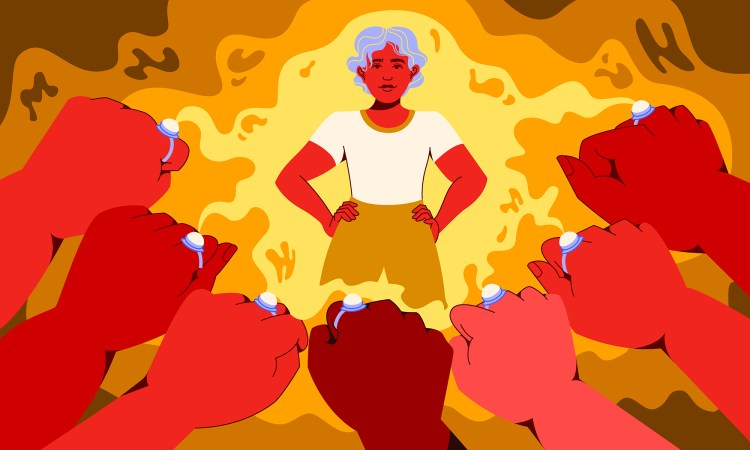
When you say you have “work stress,” what exactly do you mean?
Chances are, you’re not talking about major things such as layoffs, fireable offenses or obvious wrongs; instead, it’s the small stuff that wears you down. Like the endless email chains that lead nowhere but swallow up an afternoon. Or the company leaders who hold long, closed-door meetings that put everyone on edge. Or being asked to work on a project that rubs against one of your beliefs or values.
Authors Rob Cross and Karen Dillon call these “microstresses” — those countless small moments that occur in every workday and drain you of time, energy and enthusiasm. For 20 years, Cross has been researching effective collaboration at different organizations. He saw that a primary source of burnout and overwhelm, even among high performers, was an endless barrage of these microstresses. However, he also found that roughly 1 person in every 10 he interviewed was what he dubbed “a ten percenter,” someone who can handle microstresses and still have fulfilling personal and professional lives.
In their new book The Microstress Effect, Cross and Dillon identify 14 common microstresses, along with tactics you can use to minimize them.
Here, they explain how your relationships can actually be a key part of your microstress tool kit.
Resilience doesn’t depend on ride-or-die friends who have your back at all times.
You can build resilience in small moments of authentic connection with a range of people in your life. Sometimes we need empathy, but then too much of it can lead us to wallow in self-pity and not take steps forward. At other times, we might need advice on a path forward, a new perspective or just the ability to laugh at the absurdity of life.
Here’s how you can find resilience in moments of microstress by reaching out to connections in your life and by making sure you have these particular types of connections in your network.
People who give you empathic support
Sometimes when you’re going through challenges, you’re not necessarily interested in advice or guidance. You just want someone who will help you feel heard and validated. This kind of support also helps you keep your emotional balance and demonstrates caring.
To do this:
• Seek out people who have common experiences or challenges
Loved ones don’t always fully understand what you’re going through, so look for people who have walked in your shoes.
• Pay it forward
Talk less, and listen more. Consider something as simple as starting with “That sounds really hard” and “I can imagine how difficult this is for you,” rather than defaulting to giving advice.
People who inspire you to see and pursue a path forward
Your relationships help in two ways: They give you actual models for moving forward and they can motivate you to move forward. They may also hold you accountable for actually doing something rather than just wallowing in self-pity.
People who are more resilient take advantage of others’ ideas to envision alternative routes forward. And by doing this rapidly in small moments, you keep microstresses from magnifying.
To do this:
• Develop “fish or cut bait” counselors
This role is more than just being a sounding board; these are people you count on to help you make the right call. Note which people in your network are good at helping you cut to the chase to make decisions — people who say things like “Don’t waste your time on that” or “If I were you, I’d just go in and ask for the promotion” — and lean on them for that purpose.
• Find your truth-tellers
A truth-teller is someone you trust to be straight with you — and someone you won’t dismiss when they say things that are hard for you to hear. They are vital for resetting your perspective and getting you to see the bigger picture when it’s hard to.
People who provide perspective when setbacks happen
It can be easy to spiral into a panic when you’re faced with obstacles, but seeing events in a broader perspective can put them in a different, more positive light. This widening is sometimes referred to as de-catastrophizing. But it can require heavy cognitive lifting to do on our own. We tend to fare much better when we have others to help us step back, reframe and see our problems in a broader context.
To do this:
• See the world through new lenses
Try leaning on a friend with little to no connection to your work. One particularly effective form of perspective we get from others is the “knock it off!” variety — someone’s blunt advice when you’re caught in a rut of overthinking, stressing or being self-critical.
• Reinforce your core values
When microstresses are battering you, build ties with people who help you remember your values. This person could be a friend who is unimpressed with your professional credentials but who cares about you as a person.
People who help you manage surges at work or at home
Think back to a time when you experienced a sudden surge at work — a late-breaking request from a key client, a difficult period because your team was short-staffed, a high-pressure presentation. How did you get through that rough patch?
If you’re like many people, you probably resorted to heroic measures to get it done. But working harder to survive surges at work or at home can throw everything off balance, undermining your sense of control over your life. A more resilient approach is to ask for help.
To do this:
• Proactively help people in your network
Don’t wait for a crisis to ask people for help or to step in to help others, either. The support you offer can be as simple as making a point to talk up other people and giving credit where credit is due in public settings.
• Identify people with shared goals
Make an effort to build relationships with people who will be eager to help you because their goals and interests intersect with yours. Look for shared goals with people that might not even be part of work. You might coordinate carpooling for your kids, for example.
People who encourage you to laugh
Laughter activates neural pathways of positive emotions, ups serotonin levels and limits stress hormones like cortisol. This translates directly into how you can protect yourself against the sting of microstresses. Laughter can help you relax and reset to where you can think better, be more creative and just feel human.
To do this:
• Share humor virtually
Small moments matter when it comes to laughter. The ability to maintain virtual ties with friends who share your sense of humor and who can lighten your mood throughout the day or week is a genuine benefit to the always-on culture.
• Use self-deprecating humor
Self-deprecation lets people see your authentic, vulnerable self and can create bonding among team members. One leader described the friction she had with a colleague in another unit. In heated moments, her colleague often had a masterful ability to disarm people by saying something like, “Well, I explained that well!” And they both would laugh.
People who can make sense of people or politics
Microstress can be created and re-created when we agonize over a passing comment, worry that we said the wrong thing to the wrong person at the wrong time or review our emails to make sure we didn’t unintentionally offend someone. When we have a trusted ally who sees the political landscape better than we do, we’re better able to position our own work and efforts with confidence — rather than worrying unnecessarily about things that don’t matter.
To do this:
• Connect with connectors
In every organization, there are natural connectors who seem to know people in other offices and departments and who may even be well connected to alumni. They are a great support for making sense out of politics.
• Maintain a network of go-to colleagues
These don’t have to be your closest allies, just people who will share their experience and perspective. One rising star in a publishing company said she regularly turned to a colleague with two decades there and who was close to retirement. “She and I weren’t particularly close, but she was above the political fray. She had amazing instincts and experience, and she was generous in sharing her thoughts on how to handle deadlines and how certain people reacted to being kept out of the loop and so forth.”
People who encourage you to unplug and take a break
Breaks are essential to our best work. Research finds that when we come back from a break, our sense of well-being has improved because the break lowered our stress, decreased our emotional exhaustion and improved our energy levels. Most ten percenters say that the breaks they and others take together provided stronger benefits. If we’re engaged with other people, it’s easier to stop ruminating on personal or professional microstresses.
To do this:
• Pursue self-improvement with others
One scientist told us that before every new year, she makes a list of all the books she planned to read. But she seldom made a dent until, at her workplace, she joined a book group that met over lunch once a month. Not only was she motivated to keep up, but she also began to connect with people in other parts of her organization — people she otherwise wouldn’t have met.
• Invest in extended networks
Ten percenters place a premium on staying connected to social networks that involve people who aren’t integral to their professional or personal lives. An interviewee named Carol joined a local outdoor coffee group that was formed in her town during the pandemic. A media executive joined a local singing group in which she knew nobody, but she loved showing up and becoming part of a community she hadn’t know existed. Even though she was an introvert, it was easy to chat and laugh between songs.
Excerpted from the new book The Microstress Effect: How Little Things Pile Up and Create Big Problems — And What to Do about It by Rob Cross and Karen Dillon. Copyright 2023 Rob Cross and Karen Dillon. Reprinted by permission of Harvard Business Review Press. All rights reserved.
Watch Rob Cross’s video — part of TED’s The Way We Work series — now:












